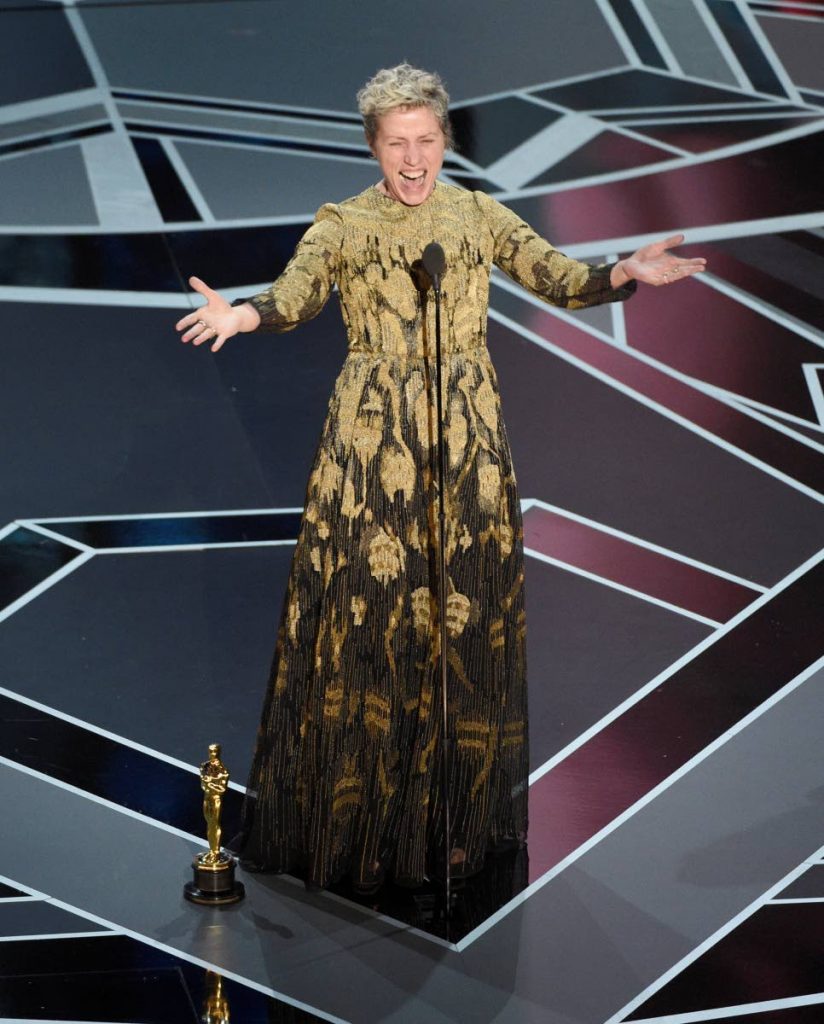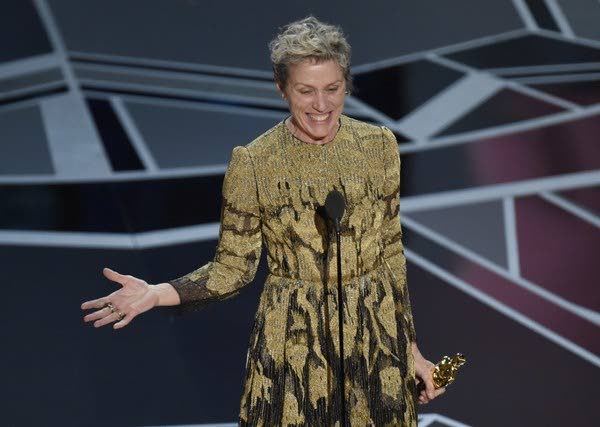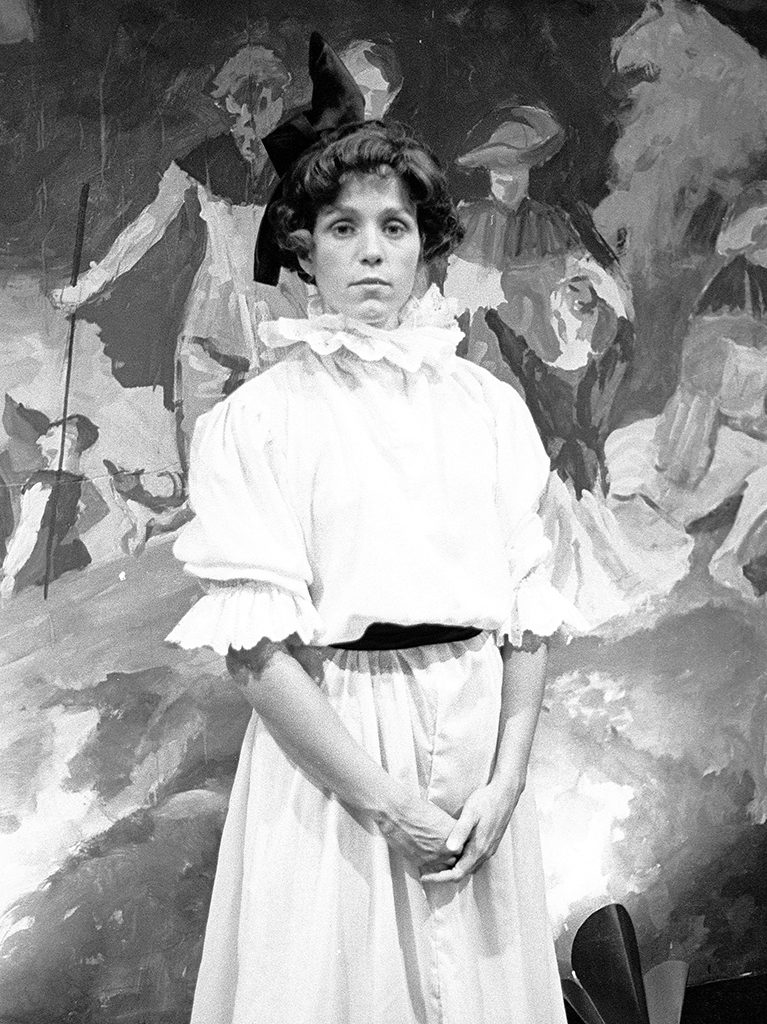From Walcott to Hollywood

Last Sunday Frances McDormand won the Best Actress Oscar for her performance as a grieving, furious mother in Three Billboards outside Ebbing, Missouri. She won her first Academy Award in 1997, for her role in Fargo.
On that occasion, Judy Raymond wrote about McDormand’s first ever professional role, 15 years before that – in a play by Derek Walcott, staged at the Government Training College in Port of Spain. We look back at McDormand’s debut in Trinidad.
When Frances McDormand won the Academy Award for Best Actress last Monday night in Hollywood, it was the climax to an acting career that began 15 years ago in Trinidad.
McDormand, 40, made her first professional appearance onstage at the Government Training College, St Vincent Street, Port of Spain, on July 1, 1982.
Fresh from graduate school at Yale, the Illinois-born McDormand was one of two American actors brought to Trinidad by Derek Walcott to appear in the first production on his play The Last Carnival.
“Someone recommended her and she came to be interviewed,” Walcott recalled vaguely, speaking from New York last Thursday. “She probably did a very short reading…It was her first job. She was just out of Yale. Actually, Angela Bassett was in the same class.” (Bassett, who also became a Hollywood star, appeared in the Yale Repertory Theatre’s production of Walcott’s Beef, No Chicken in 1982, along with the late Trinidadian actor Sullivan Walker.)
McDormand won the Oscar for her performance as Minnesota police chief Marge Gunderson in Fargo, a film by the Coen brothers Joel and Ethan. (She’s married to Joel Coen.)

It made an impression on Walcott when, a few years after her visit here, on a trip to New York he found himself “lining up and paying money to see a movie with Fran in it.”
That was the 1987 comedy Raising Arizona, the Coens’ second film, starring Nicolas Cage and Holly Hunter. McDormand also appeared in their first, Blood Simple, in 1984. Also among the 20 films she has made are Lone Star, The Butcher’s Wife, Miller’s Crossing, Darkman and Short Cuts. She was nominated for an Oscar in 1988 for her performance in Mississippi Burning.
In Walcott’s The Last Carnival, McDormand played Agatha Willett, a 25-year-old working-class English governess who comes to work for the French Creole De la Fontaine family. In the second act, which is set two decades later, she played Clodia, the daughter of the family, and Mavis Lee Wah played the older Agatha.
With the exception of Judy Stone, local critics didn’t much like the play, a revised version of In a Fine Castle, which was first staged in 1971 and which was a response to the Black Power uprising. It examines the validity of European culture and of the descendants of European colonists in the modern Caribbean.
In 1948, the young Agatha has ideas about servants and about race relations that seem radical to her French Creole hosts; by 1970, however, she has become one of them, and it’s her former pupil Clodia whose views shock the family.
“She wasn’t very happy about the part,” Walcott admits. “That character has always given me problems.”
But he found McDormand a “terrific, concentrated, consummate actress.” Walcott’s daughter Anna, in a letter to the Express last week, described McDormand as “fantastic.” Remembering the production’s setting among “peeling paint, termite-tunnelled walls and hard-back chairs,” Anna Walcott wrote that nevertheless: “You could feel her energy and you knew she was a star!”

PHOTO BY MARK LYNDERSAY
The critics agreed with Walcott that the American actress gave a good performance in her dual role as an Englishwoman and a Trinidadian. Sunday Express reviewer Jeremy Taylor called her “convincing,” Raoul Pantin, though his review was headlined “Disappointing,” called McDormand “very credible.” Writing in the Guardian, Stone said it was “marvellous to watch Fran McDormand’s face.”
Both Taylor and Earl Lovelace (in a third review in the Express) objected to American actors’ playing Trinidadians. Taylor wrote that the actors’ “brave attempt at creolisation” simply reminded one that they were Americans. Lovelace complained that the use of Americans “robs us…of the opportunity of seeing native talents deal with their own important story.”
The play was staged by Walcott’s Warwick productions. Walcott, who was based in Boston, where he taught at the university, had resigned six years earlier from the Trinidad Theatre Workshop, which he had founded in 1959. There were continuing differences of opinion over his use of American actors, which Walcott saw as an exchange from which both sides could learn.
Nevertheless, the rest of the cast of The Last Carnival were TTW stalwarts. Among them were Maurice Brash, the late Charles Applewhaite, Errol Roberts, the late Fred Hope and Jean Maynard.
With help from Walcott’s son Peter, artist Jackie Hinkson painted the set, a huge reproduction of Watteau’s 18th-century piece Embarkation for Cythera. (Watteau is emulated by one of the characters, Victor de La Fontaine, played by the other American, Cotter Smith.)
McDormand was modest about her performance, telling Sunday Express reporter Anthony Milne in an interview: “I regret not having learnt the Trinidadian accent better than I did. I don’t think I could have fooled anyone.”
She’d been coached by Walcott’s wife at the time, Norline, and the Trinidadian expression she liked best was the steups, she said.
McDormand said the six weeks she spent in Trinidad were a “glorious adventure,” although she didn’t know anything about the place until she came here.
She had also enjoyed working on the production. “It was great working with someone like Mr Walcott,’ she said, and she commended her fellow performers. “I have met and worked with some very talented people here, people who work out of a desire to perform well, and not just for the external praise.”
The production, which was backed by the late Clara Rosa de Lima, didn’t do well in its 17-night run, partly because of Walcott’s rift—now healed—with the TTW.
“It was a hard time,” Walcott recalled.
But McDormand’s response to his actors remains one of Walcott’s positive memories of the production.
“She really admired the company a lot,” he said last week, “especially Fred and Maurice.” (Fred Hope played the De La Fontaines’ servant George, Brash the rum-swigging planter Oscar De La Fontaine.)
Walcott has always had an international vision for Caribbean theatre, and wanted his company to be able to match the best in the world. His own stature was recognised when he won the Nobel Prize for literature in 1992. But it still means much to him that an actor who went on to win an Oscar should have admired the struggling theatre company she met on her glorious Caribbean adventure 15 years ago.


Comments
"From Walcott to Hollywood"